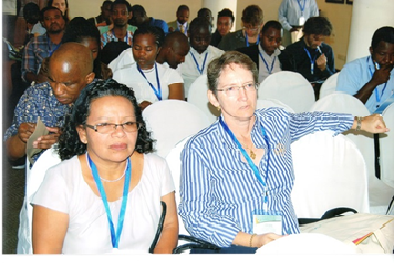The Symposium was officially opened by the Tanzanian Vice President, Dr. Gharib Balal. The key note address on the “Major Sources of Uncertainty on IWRM, Science and Practice in Adaptive Management”, was delivered by Prof Francis Mutua. The key note address gave food for thought on where we have been going wrong with IWRM, and made recommendations that stated that the modeling and IWRM implementation should mainstream Interactions among the targets as "Everything Flows”. The Symposium captured over 300 presentations, in 12 sessions, including Special Sessions, and 38 poster presentations. The Symposium was attended by over 300 participants from Southern and East Africa, amongst whom included professionals, academicians, policy makers and young scholars with keen interest in water related research.
GWP SA convened a special session on ‘Taking Research for Development Forward in Southern Africa: Lessons from the Challenge Programme on Water and Food – Limpopo Basin Development Challenge (CPWF – LBDC) in the Limpopo Basin”. The session was chaired by GWP SA’s Executive Secretary, Ruth Beukman, and moderated by Dr. Amy Sullivan, the CPWF LBDC Project Coordinator.
GWP SA is supporting learning for innovation and adaptive management through the work of the second phase of the Challenge Programme on Water and Food (CPWF) in the Limpopo Basin Development Challenge (LBDC) Project. The CPWF is a research to action and impact project being implemented by the Food, Agriculture and Natural Resources Policy Analysis Network (FANRPAN). It aims to increase the resilience of social and ecological systems through better water management for food production. It does this by focusing on the nexus between water, food and poverty in developing countries.
The session generated interest to share results on and provide feedback on 5 inter-related approaches (L1-L5) thus ensuring relevant and timely research to inform decision makers in the face of changing conditions. Four studies were presented during the session:
Under L1 – Targeting and Scaling Out, A presentation on the TAGMI tool (Available at: http://www.seimapping.org/tagmi/index.php) was given. The tool helps to assess and map the likelihood that a given intervention will be successful in given locations, at the basin scale.
- Under L2 - Small-Scale Water Infrastructure (SWI) in the Limpopo Basin: Key Messages, Scientific Contributions & Lessons Learnt, the presentation looked at the variety of water infrastructures and techniques being used in the Limpopo Basin, their failures and successes and how these infrastructures and techniques could work elsewhere.
- The paper argued the need to match appropriate agricultural interventions with specific rural communities. Choosing the correct end-user is critical, s/he must also be on the level (understanding, tools, and equipment) of what you want to demonstrate and achieve
- Under L3 - Farming Systems & Diversification, a presentation looking at Innovative farming systems, livelihood options and partnerships that have been used to incorporate livestock for improved water use efficiency and livelihoods in the Limpopo was given.
- A key lesson learnt is that improving existing systems does not lead the change we expect, sometimes the system must change. There is a need to find workable points and system leverage points.
- Under L4 - Water Governance, the presentation showed how municipalities and projects govern their water resources and how this has a profound impact on people’s livelihood opportunities and sustainable development of water resources. The presentation looked at inter-related dimensions that should be in place in tackling governance issues: people/ community engagement; technological choice, integration of water use, sustainability and ownership. It gave practical implications of cases where multiple water uses are not implicated.
In summary, each presentation told the LBDC story by resolving to answer the following questions:
- What kinds of interventions have been tried across the basin?
- What are critical factors of success and setbacks?
- How can we replicate and build on the successes?
By sharing the LBDC research, the various researchers reaffirmed the need to continue sharing the results with various partners for further knowledge sharing and development impact. There was further identification for a strong need to work with governments at local level. The audience was further informed that the research outputs would be hosted on various institutional websites.
